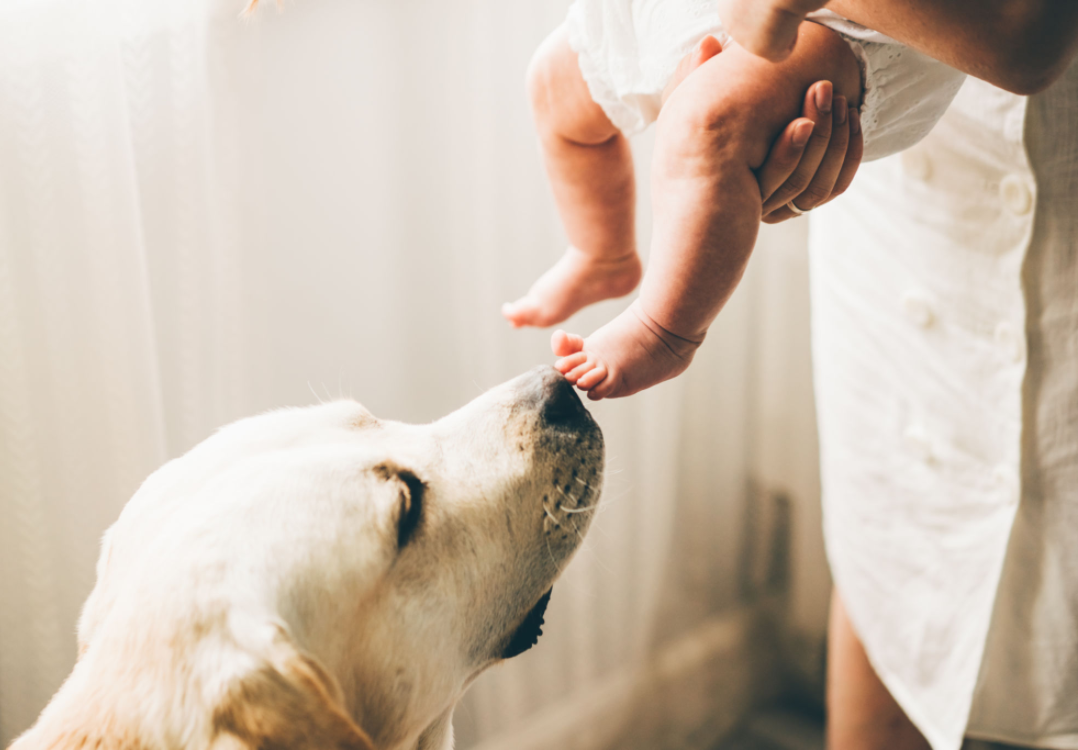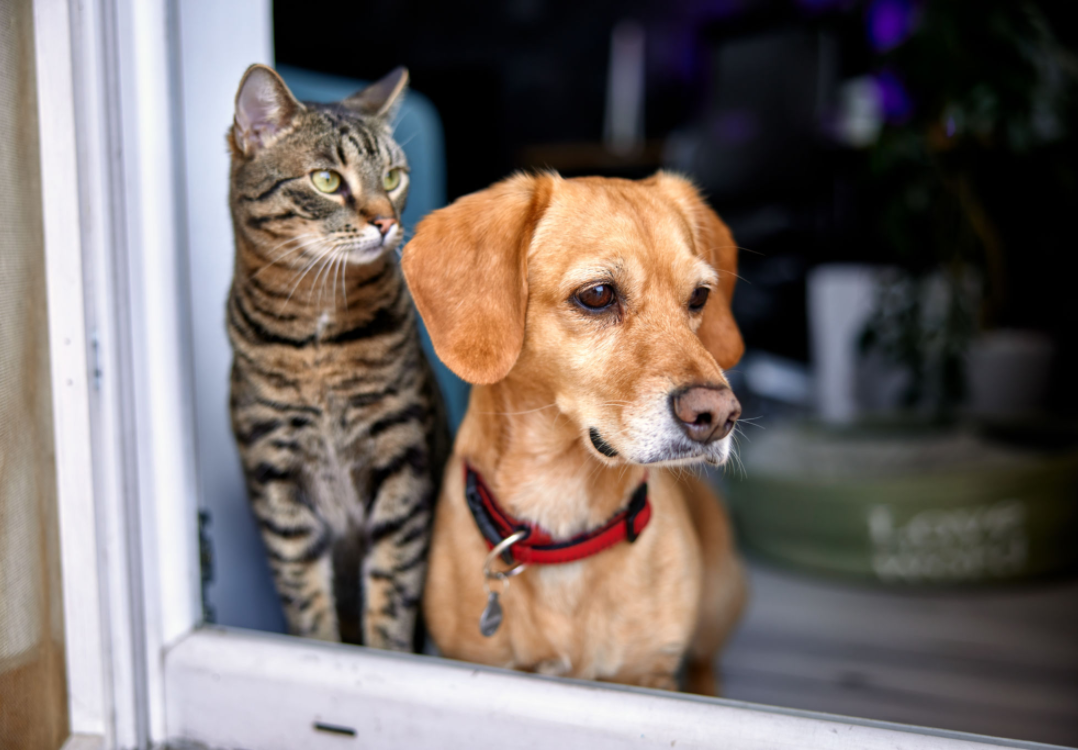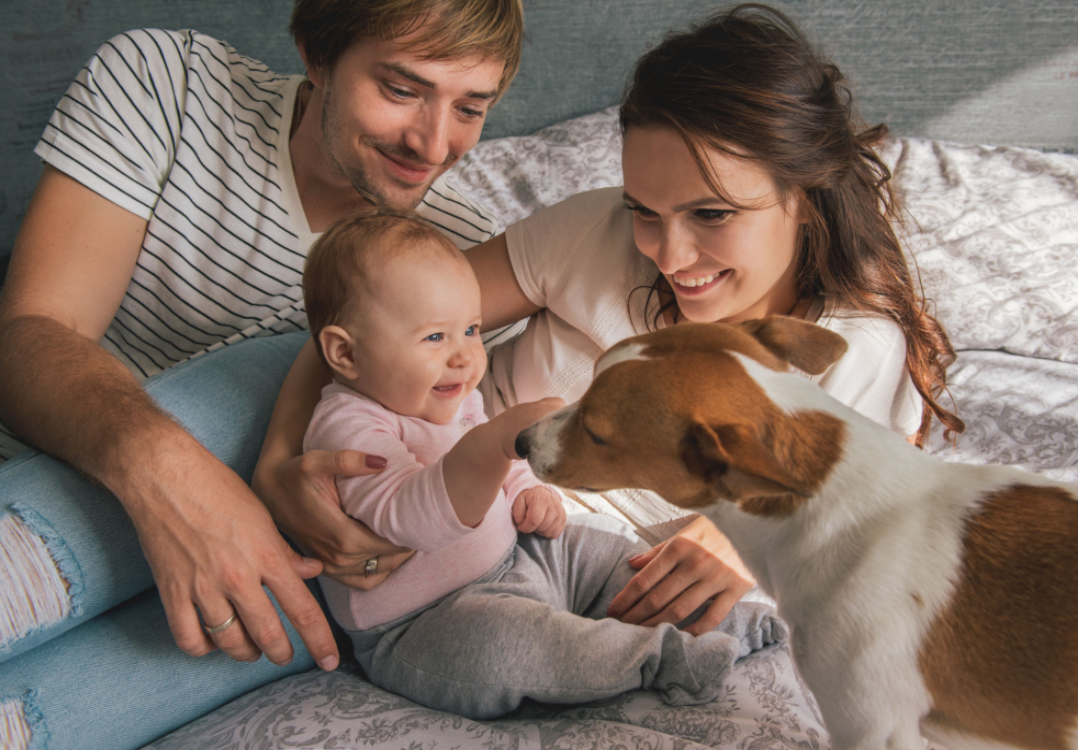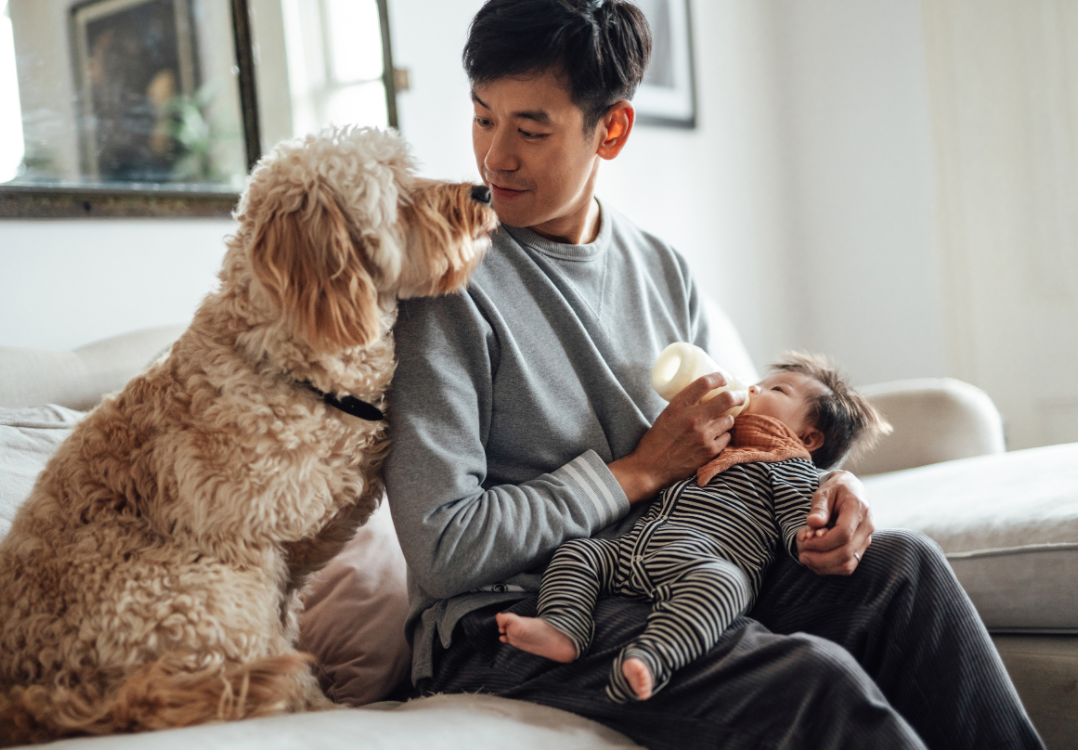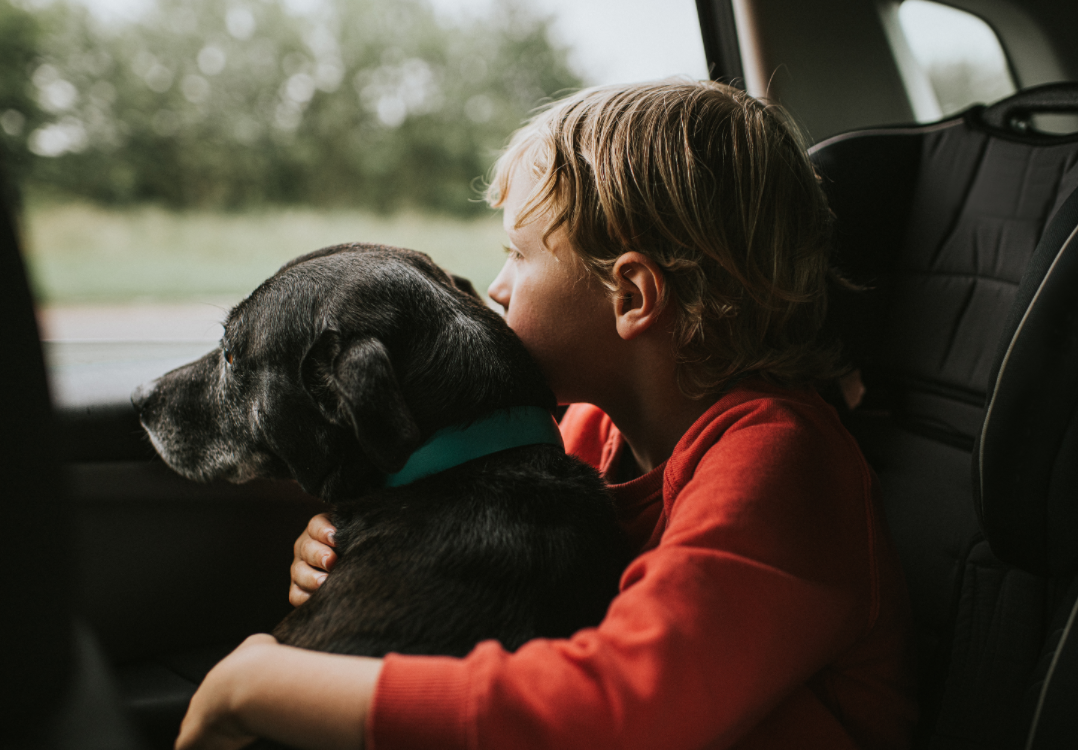Welcoming a new baby into your home is an exhilarating and joyous occasion for any family. The anticipation of cuddles, laughter, and precious moments fills the air, as you prepare to embark on this remarkable journey of parenthood. Amidst the excitement, it’s important to consider the feelings and needs of your beloved pet.
At the Motherhood Center in Houston, we understand the significance of creating a harmonious household when a new baby arrives. Our comprehensive guide will walk you through preparing your pet for your new baby’s arrival and building a positive relationship between them. With our expertise and your love, you can ensure a smooth transition for your pet and create a nurturing environment where both your pet and your child can flourish together.
For years, your pet has been your trusted companion, offering unconditional love and unwavering loyalty. They have shared in your joys and comforts, forming a unique bond with you and becoming an integral part of your life. Now, as your family grows, it’s crucial to ensure that this cherished member of your household embraces the changes with ease and grace. Let us guide you through this wonderful journey, as you prepare your heart and your pet’s heart for the expansion of love and joy that comes with a growing family. So, let’s dive in and explore the art of harmonizing your pet’s world with the arrival of your newest family member.
Understanding Your Pet’s Behavior during Pregnancy
Welcoming a new baby into your home is a time of great joy, but it can also be a period of adjustment for your furry friend. During pregnancy, your pet may sense the changes happening in your household and may exhibit signs of anxiety or stress. Understanding your pet’s behavior during this time is crucial to help them adapt smoothly to the upcoming changes.
Pets are incredibly intuitive creatures and can pick up on shifts in their environment. They may notice changes in your routines, mood, and even physical changes in your body. Some common signs of stress or anxiety in pets during pregnancy include increased clinginess, restlessness, changes in eating habits, and withdrawal from normal activities.
Establishing a calm and reassuring environment is essential for your pet during this period. Stick to your regular routines as much as possible, providing them with consistent care and attention. Spend quality time with your pet, engaging in activities they enjoy, and ensure they receive regular exercise and playtime.
If your pet’s behavior becomes concerning or if you notice significant changes in their demeanor, it’s a good idea to consult with a veterinarian or a professional animal behaviorist. They can offer insights and strategies to help ease your pet’s transition and ensure a harmonious household when your new baby arrives.
Remember, your pet is a cherished member of your family, and with understanding and patience, you can help them embrace the upcoming changes and continue to be a loving and supportive part of your growing family.
Gradual Changes and Familiarization
Gradual changes and familiarization are essential aspects of preparing your pet for the arrival of your new baby. By introducing baby-related scents and acclimating your pet to baby items, you can help them adapt to the upcoming changes in their environment.
Start by introducing your pet to baby-related scents, such as baby powder or lotion. Allow them to explore these scents under supervision, creating positive associations with the new smells. This gradual exposure will help them become more comfortable with the idea of having a baby in the household.
Next, familiarize your pet with baby items like cribs, strollers, and toys. Set up the baby’s nursery in advance and allow your pet to explore the space. This will give them time to get used to the new items and reduce any potential stress or anxiety they might feel when the baby arrives.
Throughout the process, use positive reinforcement to reward your pet’s calm and positive behavior around baby-related items or scents. Be patient and understanding, as every pet may adjust at their own pace. With gradual changes and familiarization, you can create a smoother transition for your pet and ensure a harmonious environment for both your pet and your new baby.
Positive Reinforcement Training
Positive reinforcement training is a highly effective approach to help your pet adapt to the changes brought on by the arrival of your new baby. This training technique involves rewarding your pet with treats, praises, or affection whenever they display desirable behavior. By focusing on positive actions, you can encourage your pet to associate the presence of the baby with positive experiences, fostering a sense of acceptance and trust.
During positive reinforcement training, identify specific behaviors you want to encourage in your pet, such as remaining calm around the baby or following commands. Whenever your pet exhibits these behaviors, immediately offer a reward, such as their favorite treat or a belly rub, while praising them with an upbeat and encouraging tone. Consistency is key, so be sure to provide positive reinforcement every time your pet displays the desired behavior.
It’s essential to avoid punishment-based training methods during this transitional period, as they can create anxiety and fear in your pet. Instead, focus on reinforcing the behaviors you want to see more of. This positive approach not only helps your pet adjust to the new family dynamic but also strengthens the bond between you and your furry companion. Over time, as your pet associates the baby with positive rewards and attention, they will feel more at ease and content in their expanded role as a member of your growing family.
Sensitivity to Your Pet’s Needs
Being sensitive to your pet’s needs during the preparation for your new baby’s arrival is crucial for a smooth transition. Maintaining their routines, offering love and reassurance, and engaging in regular playtime are essential aspects of this process.
Pets thrive on stability and predictability, so keeping their daily routines consistent is vital. Stick to their regular feeding, play, and exercise schedules to help them feel secure amidst the changes.
Provide your pet with plenty of love and attention, as they may seek additional comfort during this transitional period. Regular playtime and physical activities will strengthen the bond between you and your pet, reminding them of their significance in your life.
By being sensitive to your pet’s needs and emotions, you can navigate the changes together as a family. Pay close attention to any signs of stress or anxiety and offer them the support and care they need to happily coexist with the newest member of your family.
Supervised Introductions
Supervised introductions are a crucial step in the process of introducing your pet to your new baby. These controlled initial interactions help ensure the safety and comfort of both your pet and your baby during their first meetings.
Before the introduction, prepare a calm and controlled environment. Keep your pet on a leash or in a separate area, allowing them to observe the baby from a safe distance. This controlled approach prevents any sudden or overwhelming reactions from your pet.
As your pet observes the baby, pay close attention to their body language and behavior. Look for signs of curiosity, calmness, and acceptance. Positive reactions, such as tail wagging or gentle sniffing, indicate a promising start to the introduction process.
Keep the first meeting brief, especially if your pet seems anxious or unsure. Gradually increase the duration of their interactions as your pet becomes more comfortable. Remember, this is a gradual process that requires patience and understanding.
Throughout the supervised introductions, ensure that both your pet and your baby feel secure and supported. Offer praises and treats to your pet when they display calm and positive behavior around the baby. By creating a positive association with the baby, you foster a sense of acceptance and harmony between your pet and your newest family member.
Establishing Safe Spaces
Creating safe spaces for your pet is a crucial step in preparing them for the arrival of your new baby. These designated areas offer comfort and security, providing your pet with a retreat when they need a break from the excitement and changes in the household.
Choose a quiet and cozy spot in your home to be your pet’s exclusive space. It should be away from the baby’s nursery and other high-traffic areas. Furnish it with your pet’s bed, toys, and familiar belongings to create a sense of familiarity and belonging.
To ensure your pet’s safety, baby-proof the designated area by removing any potential hazards. This precautionary measure will give you peace of mind, knowing that your pet has a secure environment. Encourage your pet to use the space regularly by spending time with them there and offering treats and positive reinforcement. This will help your pet associate the safe space with positive experiences, making it a comforting haven for them. By establishing these safe spaces, you provide your pet with a peaceful sanctuary where they can adjust to the new family dynamic and feel secure amidst the changes.
Managing Potential Challenges
Preparing your pet for your new baby’s arrival involves addressing potential challenges that may arise during this transition. It’s essential to be proactive and well-prepared to ensure a harmonious environment for everyone in your household.
One potential challenge is dealing with jealousy and attention-seeking behavior from your pet. As they adjust to sharing the spotlight, your pet may exhibit signs of jealousy, such as seeking extra attention or acting out. Be mindful of their emotions and continue to show them love and affection. By maintaining consistency in your interactions and reassuring your pet of your love, you can help them navigate this change more smoothly.
Another challenge that may arise is territorial behavior. Pets can be protective of their space and belongings, and the arrival of a new baby can disrupt their established routines. Gradually introduce baby-related items into your home and let your pet explore them at their own pace. This gradual approach can help them become more comfortable with the changes and reduce any territorial tendencies.
In managing these challenges, communication and understanding are vital. Take the time to observe and interpret your pet’s behaviors, seeking professional advice if needed. Consulting with a veterinarian or an animal behaviorist can provide valuable insights and strategies tailored to your pet’s specific needs.
By addressing potential challenges with patience and care, you can create a positive and supportive environment that helps your pet and your new baby thrive together. Remember, with love and understanding, your pet will adapt to its new role as a beloved member of your growing family.
Ensuring Supervision at All Times
When introducing your pet to your new baby, it’s crucial to prioritize safety by ensuring supervision at all times. Never leave your pet and baby unattended, especially in the early stages of their relationship.
During the initial interactions, keep your pet on a leash or in a separate area where you can closely monitor their behavior around the baby. This controlled environment allows you to intervene if necessary and prevents any potential accidents or misunderstandings.
As your pet and the baby become more comfortable with each other, you can gradually increase their interactions, but still, maintain supervision. Always be present during playtime or any direct contact between them.
Setting boundaries and providing a safe environment is essential for both your pet’s and the baby’s well-being. Make sure that your pet’s safe spaces are respected and free from the baby’s access. Baby-proofing the house ensures that there are no hazards that could harm either the baby or the pet.
Remember, even the gentlest and most well-behaved pet may have unpredictable reactions to a new baby. Supervision not only ensures their safety but also allows you to observe their interactions and make adjustments as needed. By prioritizing supervision at all times, you can create a secure and loving environment where your pet and your baby can develop a strong and positive relationship.
Seeking Professional Advice
When preparing your pet for your new baby’s arrival, seeking professional advice can be invaluable in ensuring a smooth and successful transition. Consulting with a veterinarian or an animal behaviorist can provide expert insights tailored to your pet’s specific needs and temperament.
A professional can help you understand your pet’s behavior and offer strategies to address any challenges that may arise during the introduction process. They can also provide guidance on positive reinforcement training techniques and ways to build a strong and positive bond between your pet and the baby.
Professional advice is especially crucial if your pet has exhibited signs of anxiety, aggression, or other concerning behaviors. An expert can help identify the root causes and develop a customized plan to address and manage these issues effectively.
By involving a professional in the process, you can gain confidence in navigating this important transition and ensure the well-being of both your pet and your new baby. Their expertise will be a valuable resource in creating a loving and harmonious environment where both your furry friend and your newest family member can thrive together.
Growing Up Together
One of the most beautiful aspects of introducing your pet to your new baby is the opportunity for them to grow up together and form a unique and lasting bond. As your baby grows, so does the relationship with your pet, creating cherished memories and an unbreakable connection between them.
Pets can be incredibly nurturing companions for children, teaching them valuable life lessons such as responsibility, empathy, and unconditional love. As your baby starts to explore the world around them, your pet can be a patient and gentle guide, fostering a sense of security and companionship.
Encourage positive interactions between your pet and your child as they grow older. Involve them in playtime, outdoor activities, and even cuddle sessions. These shared experiences will further strengthen their bond and create a foundation of trust and friendship.
As your child grows, teach them to respect and care for their furry friend. Show them the importance of gentle handling, respecting boundaries, and understanding their pet’s needs. This mutual respect will deepen their connection and ensure a safe and loving relationship.
Watching your pet and your baby grow up together is a heartwarming experience. The bond they form will be filled with love, joy, and countless precious moments that will be treasured for a lifetime. By nurturing their relationship and fostering a positive environment, you are providing your child with a lifelong friend and an invaluable source of companionship and support.
Conclusion
As you embark on the journey of preparing your pet for your new baby’s arrival, remember that patience, understanding, and positive reinforcement are the keys to success. Each pet is unique, and their reactions to the changes will vary. Be attentive to their needs and emotions, and seek professional advice if necessary to address any challenges that may arise.
At the Motherhood Center in Houston, we understand the significance of creating a harmonious household when a new baby arrives. Our comprehensive guide has provided valuable insights on how to introduce your pet to your new baby and build a positive relationship between them. Alongside this resource, we offer a range of other services and support for new parents.
From prenatal classes and postpartum support to lactation consultations and parenting workshops, the Motherhood Center is a hub of resources for new parents. Our experienced team of experts is dedicated to helping you navigate the joys and challenges of parenthood. Whether you need assistance with pet preparation or seeking guidance on various aspects of early parenthood, we are here to support you every step of the way.
Establishing safe spaces, encouraging positive interactions, and fostering mutual respect will create a secure and harmonious environment where your pet and your new baby can form an unbreakable bond. Embrace this transformation with an open heart, and with the resources and support available at the Motherhood Center, watch as your pet and your new baby grow up together, creating cherished memories and a lifelong friendship.
FAQs
How can I help my pet adjust to the new baby’s arrival?
You can help your pet adjust by gradually introducing them to baby-related scents and items, maintaining their routines, and providing plenty of love and attention during the transition.
Is it safe to let my pet and baby interact?
Yes, but always supervise their interactions. Start with short, controlled introductions and observe your pet’s behavior closely to ensure a safe and positive experience for both.
My pet seems anxious around the baby. What should I do?
Be patient and give your pet time to adjust. Offer positive reinforcement when they display calm behavior around the baby. If the anxiety persists, consult a veterinarian or an animal behaviorist for guidance.
How can I create a safe space for my pet?
Designate a quiet and cozy area away from the baby’s nursery. Fill it with your pet’s familiar belongings and remove any potential hazards to ensure their safety and comfort.
Will my pet and baby form a strong bond as they grow up together?
Yes, pets and babies often develop a special and enduring friendship. Encourage positive interactions, involve them in activities, and teach your child to respect and care for their furry companion. This bond will strengthen over time and become a cherished part of your family’s journey.
